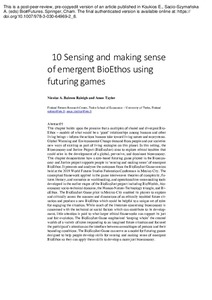Sensing and making sense of emergent BioEthos using futuring games
Balcom Raleigh Nicolas A.; Taylor Amos
https://urn.fi/URN:NBN:fi-fe2021042827292
Tiivistelmä
Abstract†† This chapter builds upon the premise that a multiplex of shared and divergent Bio-Ethos –models of what would be a ‘good’ relationships among humans and other living beings–inform the actions humans take toward living nature and ecosystems.Global Warming and Environmental Change demand from people and our societies new ways of existing as part of living ecologies on this planet.In this setting, the Bioeconomy and Justice Project (BioEcoJust) aims to explore ethical troubles that could arise in the development of a global, pervasive, and dominant bioeconomy.This chapter demonstrates how a role-based futuring game piloted in the Bioecon-omy and Justice project supports people in ‘sensing and making sense’of emergent BioEthos. It presents and analyses the outcomes from the BioEcoJust Game session held at the 2019 World Futures Studies Federation Conference in Mexico City. The conceptual framework applied in the game interweaves theories of complexity, fu-tures literacy, and scenarios as worldmaking, and operationalizes sensemaking tools developed in the earlier stages of the BioEcoJust project including BioWorlds, bio-economy socio-technical domains, the Human-Nature-Technology triangle, and Bi-oEthos. The BioEcoJust Game pilot in Mexico City enabledi ts players to explore and critically assess the nuances and dimensions of an ethically troubled futures it-uation and produce a new BioEthos which could be helpful toa unique set of roles for engagingthe situation. While much of the literature concerning bioeconomy is concerned with the technical or social factors which can contribute to its develop-ment, little attention is paid to what larger ethical frameworks can support its just and fair evolution. The BioEcoJust Game emphasised ‘keeping whole’ the created worlds of a variety of roles responding to an imagined future situation and focused the participant’s attention on the interface between assemblages of persons and their bounding conditions.The BioEcoJust Game can serve as a model for futuring games designed to help people develop skills for sensing and making sense of emergent BioEthos so they can apply these skills to develop a more just bioeconomy.
Kokoelmat
- Rinnakkaistallenteet [19207]
